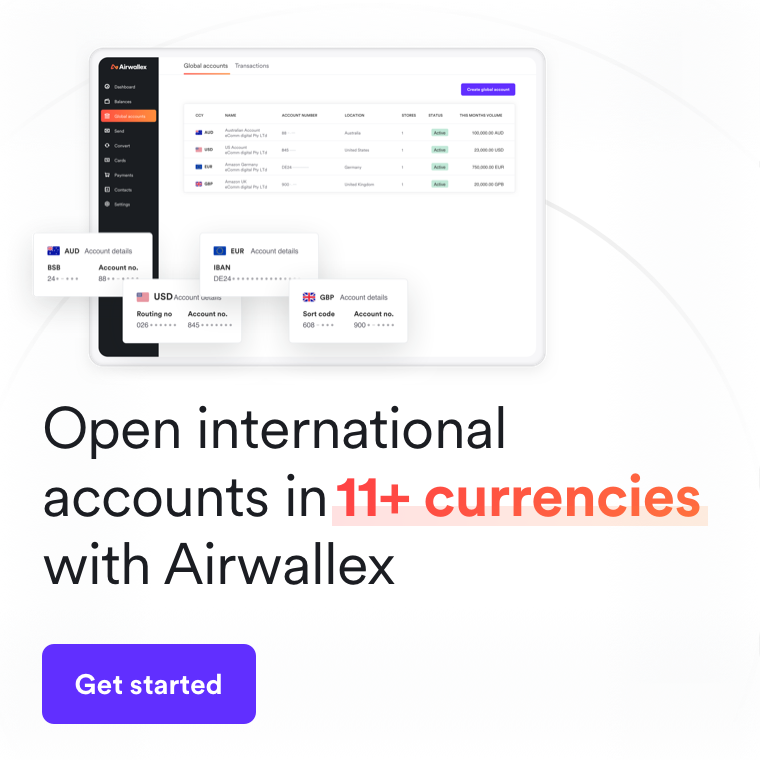Foreign currency accounts vs. global business accounts—what’s the difference?

These days, all of the big banks offer some form of an international business account option. But not all are created equal.
Some banks offer foreign currency accounts, dedicated to specific currencies. Others might offer a global business account, made specifically for larger organisations. It can be confusing as a business to find the type of account that’s right for your needs.
So let’s look at the difference between foreign currency accounts and global business accounts, and what this means for your business.
What are foreign currency accounts?
A foreign currency account is a specific account offered by your bank that allows you to send, receive, and hold foreign currencies. They’re also known as multi-currency accounts, due to their capacity to hold multiple foreign currencies within the account.
It’s essentially like having different wallets available for different currencies. Thanks to this feature, a foreign currency account actually allows you to sidestep some of the disadvantages associated with international money transfers. Instead of sending and receiving currency immediately, at the mercy of international exchange rates, you’re able to hold this foreign currency safely within your dedicated account.
This works to effectively hedge against currency fluctuations. You can then convert your currency at a time that suits you, enabling you to choose a time and a rate that suits you better.
This leads us to one of the big benefits of a foreign currency account. Unlike a traditional international money transfer, you don’t have to convert your money every time to send or receive a payment. As your account is dedicated to foreign currencies, you’re sending and receiving money already in that currency. There are no associated transfer fees.
However, you’re still transferring money between banks internationally using SWIFT bank details, so there are still transfer fees involved. It’s important to check the fee structure that your bank has imposed on your foreign currency account. Figures vary between banks, and you may find yourself paying up to $20 each time to send and receive your funds.
Also, if you want to access your foreign currency funds through a debit or credit card to pay for things like USD software subscriptions, traditional foreign currency accounts do not come with an attached business card. This means you need to transfer and convert your foreign currency funds into your local AUD business account with a payment card attached to use your funds - often incurring two international transaction fees. First, when you’re converting into AUD, and another 3% international card transaction fee when you make the payment.

Who uses foreign currency accounts?
Businesses of all sizes can benefit from using a foreign currency account.
eCommerce businesses with a predominantly international client base will find them particularly useful. You’re able to send and receive payment in your target market’s currency, without needing to pay currency conversion fees each time.
Professional services with international clients or agencies that work with remote staff and freelancers will find foreign currency accounts particularly useful. They allow you to pay wages and contractor fees in their local currency, without relying on intermediary platforms and or online job boards (which are known to take a percentage each way).
Foreign currency accounts are also useful for retail or manufacturing companies with global customers, and wholesalers who want to receive payment from their wholesalers, then pay their suppliers directly with this currency, rather than converting currency every time.
What are global business accounts, and how are they different?
Global business accounts work in a similar fashion to foreign currency accounts. But we like to think of them as the upgrade to foreign currency accounts to really lower the cost of global business.
These accounts are typically run through partner networks. Your bank in Australia might be part of a network that covers the UK, Europe, Canada, and the US, for example. With a global business account, you’re then able to set up an account in a foreign country with that country’s local bank details.
So while you’re opening the account here in Australia, you’re able to connect globally and use the local payment networks. You’re able to use your new local account details, in that particular country, to send and receive payments in their currency like a local, and avoid international transfer fees altogether.
The advantages of a global business account
In addition to the benefits associated with foreign currency accounts, there are some big advantages that come with a global business account.
Faster payments. You’re using local banking methods to send and receive payments, which cuts out a lot of the intermediary systems involved with international transfers. This cuts down your transfer times dramatically.
Less confusion. You’re using local bank details instead of international bank details and SWIFT codes, which will be much easier for your international customers, clients, and suppliers to understand.
Lower fees and fewer costs. Making a local bank transfer, rather than taking the time to make an international money transfer, comes with less fees, and there are fewer intermediary costs involved.
But as these are very much business accounts, they’re charged as such. Global business accounts may charge high monthly fees. Some may even require a minimum deposit amount that you need in your account before you can start transacting.
Collect international payments more securely with Airwallex
At Airwallex, we’ve created a powerful alternative to foreign currency accounts. Our Global Business Accounts are made for businesses who have their eyes set firmly on international growth
Unlike these other accounts, Airwallex doesn’t charge any setup fees. There are no monthly minimum fund thresholds to keep, and no monthly or annual fees—ever. We don’t charge you any transaction fees either, just a small fee when converting funds.
You’re able to create Global Accounts in the US, UK, EU, or HK in minutes. You’re able to send, receive, and hold funds in 11+ different currencies. Create individual wallets for these currencies, and you can start making payments immediately.
And when you do decide to pay out your money, we offer competitive exchange rates that are just 0.3% or 0.6% above the interbank exchange rate.
So when you’re ready to streamline how you collect, hold, and pay money internationally, connect with our product specialists to find out more.
Keen to see how it works? Get in touch today.
Related article: The benefits of a digital business bank account

Share
View this article in another region:China


